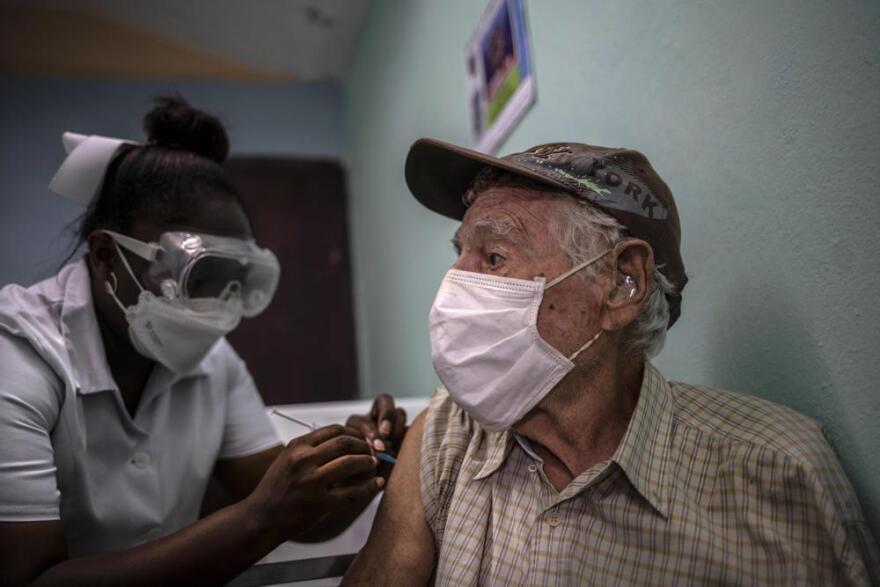Last week, Cuba began exporting its own COVID-19 vaccines. The problem is that while Cuba insists its vaccines are safe and effective, the World Health Organization has not approved them.
And that could become a big controversy in Latin America and the Caribbean, where Venezuela is the first customer for Cuban vaccines — and where many doctors argue they shouldn't be administering those shots without the WHO green light.
WLRN’s Luis Hernandez spoke with Americas Editor Tim Padgett, who’s been following developments with Cuba's vaccines. Here are excerpts from their conversation, edited for clarity.
HERNANDEZ: Tim, tell us about the vaccine that Cuba started commercially exporting and how it was how developed?
PADGETT: Cuba has been developing a few COVID vaccines, but the one it's exporting first is called Abdala. It's named after a dramatic poem by Cuban independence hero José Martí — that sort of thing is common in communist Cuba. It's a three-shot vaccine developed by Cuba's Center for Genetic Engineering and Biotechnology. It's a more conventional vaccine, not one of the newer messenger-RNA vaccines like Pfizer — and Cuban scientists claim it's 92 percent effective against COVID infection.
And which countries so far are importing the Abdala vaccine?
Right now, there are only two customers. Vietnam, whose government is a communist ally of Cuba's; it received almost a million Abdala doses last week. We don't know if they've begun administering them yet. Socialist Venezuela, another crucial Cuba ally, has gotten an undisclosed number of doses and it has begun administering them. We don't know if there have been any problems.
Cuba's obviously hoping to export it to more countries, especially smaller, poorer countries that haven't had as much access to U.S.- and European-developed vaccines like Pfizer's.
EDITOR'S UPDATE: Since this conversation, Nicaragua announced it had authorized Cuba's Abdala and Soberana vaccines for emergency use and is receiving shipments. On Tuesday, the Venezuelan government said it had received almost a million Abdala doses in recent days.
Are these vaccines as safe and effective as Cuban scientists insist they are? I mean, a few weeks ago ... you and I talked about the fact that Cubans have even started using them to vaccinate young children.
We really don't know for sure because, as you mentioned, the arbiter of these things, the World Health Organization, has not yet approved Cuba's vaccines. And experts say that hasn't happened because Cuba hasn't published sufficient data about them.
Cuba says it has started the process of getting WHO approval for its vaccines — the Soberana varieties as well as Abdala — and it insists that it’s followed all the clinical trial-phase protocols for safety and efficacy. When it comes to vaccinating kids, Cuban scientists insist their vaccines are safe for pediatric use. But until they get WHO approval, the Cubans are just asking the world to take their word for it because their biopharmaceutical industry does have a solid international reputation.
But exporting the vaccines is a whole other issue. ... Even in Venezuela, aren't we seeing pretty strong pushback from the medical community?
We are. Last week, Venezuela's National Academy of Medicine, which is one of the few institutions in Venezuela not controlled by the regime, said it was deeply concerned that the Cuban vaccine is going to be administered to people there without the WHO approval. Most countries require that before they import a vaccine.
Dr. Rafael Gottenger is head of the Venezuelan-American Medical Association here in Miami and he says doctors in Venezuela are telling him they're balking at using it:
“It’s common sense in any scientific community in the world. It’s very sad that there's no scientific data, only data that has been published by a political party in Cuba – and then you try it in Venezuela. Are people guinea pigs there or what?”
So how do you see this whole dispute turning out in the end for Cuba and Latin America and the Caribbean?
Whether or not Cuba gets the WHO approval for its vaccines, I see it pushing ahead with its export drive for two key reasons. First, Cuba badly needs the money. As you know, its economy is wrecked. In fact, it wants to get 90 percent of its population vaccinated by December so it can start opening the island up to tourism again.
Second, many Latin American countries badly need the vaccines. They've mostly been importing Chinese and Russian vaccines, but they might prefer a cheaper, closer source. And frankly, if they believe 90 percent of the Cuban population is getting safely and effectively inoculated with these vaccines, we'll have to wait to see if in the end they really care about the WHO approval.
Copyright 2021 WLRN 91.3 FM. To see more, visit WLRN 91.3 FM.



